
In 1998, Dr. Lisa I. Iezzoni became the first woman appointed professor in the department of medicine at Beth Israel Hospital. Throughout much of her career, she has focused her research agenda on the health concerns of people living with disabilities.
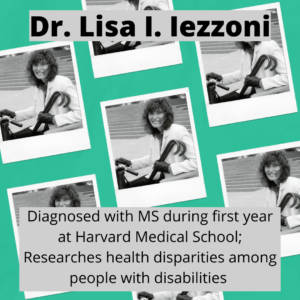 Iezzoni earned a master’s degree in health policy from the Harvard School of Public Health in the 1970s, and went on to receive her medical degree from Harvard Medical School in 1984. During her first year of medical school, she was diagnosed with multiple sclerosis (MS). Because of the lack of accommodations available at the time for people with disabilities, as well as the lack of acceptance within medicine, she opted to follow a research track rather than complete an internship and become licensed as a medical doctor.
Iezzoni earned a master’s degree in health policy from the Harvard School of Public Health in the 1970s, and went on to receive her medical degree from Harvard Medical School in 1984. During her first year of medical school, she was diagnosed with multiple sclerosis (MS). Because of the lack of accommodations available at the time for people with disabilities, as well as the lack of acceptance within medicine, she opted to follow a research track rather than complete an internship and become licensed as a medical doctor.
With her background in health policy, this was a natural fit. Her research has largely focused on measuring quality of care and improving fairness of payment. Additionally, she has researched disability, including health policy issues, health disparities, and the implications of disabling conditions on daily life.
In recent years, she has gotten involved in the #DocsWithDisabilities movement, calling for the profession to be more open and less ableist in order to improve healthcare.
Info and photo source: https://cfmedicine.nlm.nih.gov/physicians/biography_161.html
Dr. Susan La Flesche Picotte was a doctor, public health advocate, and social reformer widely recognized as the first Indigenous woman to obtain a medical degree in the U.S. Dr. La Flesche Picotte was born in the Omaha reservation in 1865, the youngest daughter of Joseph La Flesche, the last recognized Chief of the Omaha tribe.
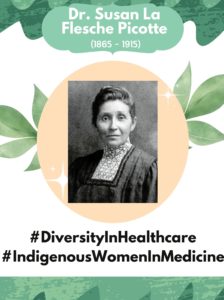 During her studies at the Women’s Medical College of Pennsylvania (WMPC), Dr. La Flesche Picotte was sponsored by the Connecticut Indian Association (CIA) throughout her medical program and overcame societal and racial discrimination to become valedictorian, graduating at the top of her class in 1889.
During her studies at the Women’s Medical College of Pennsylvania (WMPC), Dr. La Flesche Picotte was sponsored by the Connecticut Indian Association (CIA) throughout her medical program and overcame societal and racial discrimination to become valedictorian, graduating at the top of her class in 1889.
Throughout her career, Dr. La Flesche Picotte worked for the Office of Indian Affairs (1889-1983) as the physician for the boarding school, was an active community advocate, and traveled in and around the reservation making house calls for community members.
She was an active social reformer and public health advocate, strongly in favor of temperance and even advocated for a prohibition law that would impact the Omaha tribe. Dr. La Flesche Picotte was a proponent of preventive care and worked on educating her community on hygiene and food sanitation, both for general health and to help prevent the spread of tuberculosis. She also helped tribal members with inheritance issues they experienced, specifically with regard to land sales.
Dr. La Flesche Picotte went on to establish the Dr. Susan La Flesche Picotte Memorial Hospital, the first privately-funded hospital on the Omaha reservation that went on to serve the tribal community until the 1940s. Today, the building stands as a National Historic Landmark and serves as a reminder of the amazing work of Dr. Susan La Flesche Picotte.
Info source: The Incredible Legacy of Susan La Flesche, the First Native American to Earn a Medical Degree, Dr. Susan La Flesche Picotte, Susan La Flesche Picotte, and Susan La Flesche Picotte, M.D.: Omaha Indian leader and reformer.
Photo source: Dr. Susan La Flesche Picotte
Jerome M. Adams served as the 20th Surgeon General of the United States from 2017 – 2021.
Dr. Adams earned his master of public health degree from the University of California at Berkeley, and his medical degree from Indiana University School of Medicine. He has completed residencies in both internal medicine and anesthesiology, and is a board certified anesthesiologist.
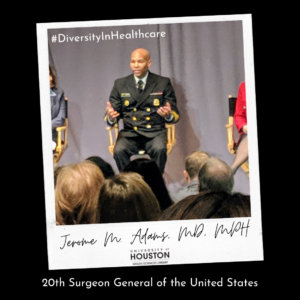 After time in private practice and serving on the faculty of Indiana University School of Medicine, Dr. Adams was appointed as Indiana State Health Commissioner. While in that position, he headed the state’s response to an unprecedented HIV outbreak.
After time in private practice and serving on the faculty of Indiana University School of Medicine, Dr. Adams was appointed as Indiana State Health Commissioner. While in that position, he headed the state’s response to an unprecedented HIV outbreak.
As Surgeon General, he oversaw the U.S. Public Health Service Commissioned Corps in order to promote and advance health. While in office, he focused on addressing the opioid epidemic as well as the COVID-19 pandemic.
He continues to be heavily involved in promoting health information to the public via traditional media outlets as well as on Twitter, where he has more than 56,000 followers.
UH librarians Rachel and Stefanie had the opportunity to see him speak in 2018, and the photo shared here was taken by Rachel at that event.
Info source: https://www.hsph.harvard.edu/voices/events/jerome-adams-20th-surgeon-general-of-the-united-states/
In 1967, Dr. Jane Cooke Wright became the highest-ranking African American woman at a nationally recognized medical institution when she was named an Associate Dean at New York Medical College. She was also the first woman to be elected as president of the New York Cancer Society.
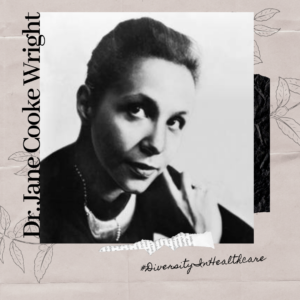 Jane Cooke Wright was born in New York in 1919, the daughter of Dr. Louis Wright, one of the first African Americans to graduate from Harvard Medical School.
Jane Cooke Wright was born in New York in 1919, the daughter of Dr. Louis Wright, one of the first African Americans to graduate from Harvard Medical School.
After graduating with honors from New York Medical College in 1945, she interned at Bellevue Hospital and completed a residency at Harlem Hospital.
The majority of her career was spent in oncology as a leader in chemotherapy research. In 1964, she was appointed by President Lyndon B. Johnson to the President’s Commission on Heart Disease, Cancer, and Stroke. Three years later, she returned to her alma mater as a leader, becoming a professor of surgery, head of the Cancer Chemotherapy Department, and Associate Dean.
Dr. Wright retired in 1987 after a long and productive career and passed away in 2013.
Information and photo source: https://cfmedicine.nlm.nih.gov/physicians/biography_336.html/
Helen Rodríguez Trías was a pediatrician, educator and women’s rights activist. She was the first Latina president of the American Public Health Association (APHA), a founding member of the Women’s Caucus of the APHA, and a recipient of the Presidential Citizens Medal. She is credited with helping to expand the range of public health services for women and children in minority and low-income populations in the United States, Central and South America, Africa, Asia, and the Middle East.
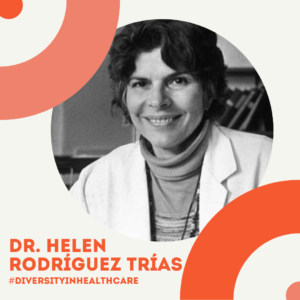 Born in New York in 1929, Helen Rodríguez spent her early years in Puerto Rico, returning to New York with her family when she was 10. Growing up as a Puerto Rican in New York City, she experienced racism and discrimination first-hand. Rodriguez-Trias earned her BA degree from the University of Puerto Rico in 1957 where she became a student activist on issues such as freedom of speech and Puerto Rican independence. She then entered the University of Puerto Rico’s school of medicine and obtained her medical degree in 1960. Rodriguez-Trias chose medicine because it “combined the things I loved the most, science and people”
Born in New York in 1929, Helen Rodríguez spent her early years in Puerto Rico, returning to New York with her family when she was 10. Growing up as a Puerto Rican in New York City, she experienced racism and discrimination first-hand. Rodriguez-Trias earned her BA degree from the University of Puerto Rico in 1957 where she became a student activist on issues such as freedom of speech and Puerto Rican independence. She then entered the University of Puerto Rico’s school of medicine and obtained her medical degree in 1960. Rodriguez-Trias chose medicine because it “combined the things I loved the most, science and people”
During her residency at the University Hospital in San Juan, she established the first center for the care of newborn babies in Puerto Rico. Under her direction, the hospital’s death rate for newborns decreased 50 percent within three years.
When she returned to New York in 1970, Dr. Rodriguez-Trias decided to work in community medicine. After attending a conference on abortion at Barnard College in 1970, she focused on reproductive rights. Throughout the 1970s, Dr. Rodriguez-Trias was an active member of the women’s health movement. She was inspired by “the experiences of my own mother, my aunts and sisters, who faced so many restraints in their struggle to flower and reach their own potential.”
Rodriguez-Trias joined the effort to stop sterilization abuse. Poor women, women of color, and women with physical disabilities were far more likely to be sterilized than white, middle-class women. Rodriguez-Trias was a founding member of both the Committee to End Sterilization Abuse and the Committee for Abortion Rights and Against Sterilization Abuse, and testified before the Department of Health, Education, and Welfare for passage of federal sterilization guidelines in 1979. The guidelines, which she helped draft, require a woman’s written consent to sterilization, offered in a language they can understand, and set a waiting period between the consent and the sterilization procedure.
Rodriguez-Trias was also a founding member of both the Women’s Caucus and the Hispanic Caucus of the American Public Health Association and the first Latina to serve as president. Toward the end of her life she said, “I hope I’ll see in my lifetime a growing realization that we are one world. And that no one is going to have quality of life unless we support everyone’s quality of life…Not on a basis of do-goodism, but because of a real commitment…it’s our collective and personal health that’s at stake.”
In January 2001 she received a Presidential Citizen’s Medal for her work on behalf of women, children, people with HIV and AIDS, and the poor. Helen Rodriguez-Trias died of complications from cancer in December, 2001.
Information and photo source: https://cfmedicine.nlm.nih.gov/physicians/biography_273.html
Mark A. Schuster, MD, PhD is the founding dean and CEO of the Kaiser Permanente Bernard J. Tyson School of Medicine. In 2010, he gave a speech on being a gay physician. His talk struck a chord with many and was published and covered widely in the media, serving as an inspiration for LGBTQ physicians and medical students.
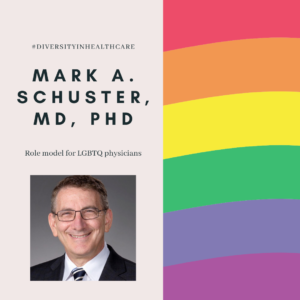 Dr. Schuster earned his undergraduate degree from Yale and his medical degree from Harvard in 1987. Throughout his education and career, he felt pressure to hide his sexual orientation in order to be successful. He was unwilling to bow to this pressure, however, and has been an unwavering advocate for fair treatment of LGBTQ clinicians and patients.
Dr. Schuster earned his undergraduate degree from Yale and his medical degree from Harvard in 1987. Throughout his education and career, he felt pressure to hide his sexual orientation in order to be successful. He was unwilling to bow to this pressure, however, and has been an unwavering advocate for fair treatment of LGBTQ clinicians and patients.
He is an international leader in child, adolescent, and family health, having researched and written extensively on these topics. He is an elected member of the National Academy of Medicine, and is currently leading the new medical school at Kaiser Permanente.
Info sources: https://hms.harvard.edu/news/doctor-out; https://medschool.kp.org/about/board-of-directors/mark-a-schuster
Photo source: https://medschool.kp.org/content/dam/internet/kp/som/homepage/about/leadership/mark_schuster_960x960.jpg
This week’s #DiversityInHealthcare feature is a native of Texas and a two-time Coog!
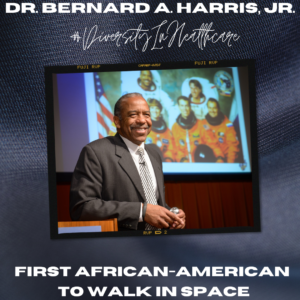 Bernard A. Harris, Jr., MD was born in Temple, Texas and earned both a BS in Biology and an MBA from the University of Houston. He completed his medical degree at Texas Tech and his residency at the Mayo Clinic.
Bernard A. Harris, Jr., MD was born in Temple, Texas and earned both a BS in Biology and an MBA from the University of Houston. He completed his medical degree at Texas Tech and his residency at the Mayo Clinic.
He has extensive experience and expertise in medicine, holding various faculty appointments as well as being the current Vice Chair of the Texas Medical Center.
Dr. Harris is best known for his illustrious career with NASA, where he spent more than 438 hours in space and was the first African-American to walk in space.
Image source: https://www.nasa.gov/sites/default/files/thumbnails/image/acd15-0005-008.jpg
Information source: https://www.nasa.gov/ames/ocs/seminars/bernard-harris
https://www.nasa.gov/sites/default/files/atoms/files/harris_bernard.pdf
Dr. Antonia Novello broke two barriers in 1990 when she became Surgeon General of the United States: she was both the first woman and the first Hispanic person to hold the office.
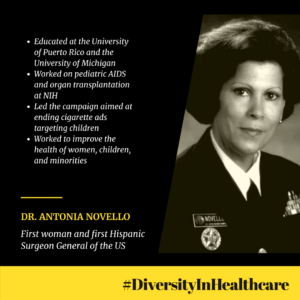 Born and raised in Puerto Rico, Dr. Novello grew up with a chronic health condition. She also had an aunt who died of kidney failure. These were her inspirations for becoming a pediatrician specializing in nephrology. She attended medical school at the University of Puerto Rico and continued her training at the University of Michigan.
Born and raised in Puerto Rico, Dr. Novello grew up with a chronic health condition. She also had an aunt who died of kidney failure. These were her inspirations for becoming a pediatrician specializing in nephrology. She attended medical school at the University of Puerto Rico and continued her training at the University of Michigan.
Prior to her stint as the nation’s top authority on public health, she had a big impact working at NIH on pediatric AIDS and organ transplant legislation. As Surgeon General, she focused on improving the health of women, children, and minorities. This included a campaign to end cigarette advertisements aimed at children, and raising awareness about AIDS.
Read more about Dr. Antonio Novello as you celebrate Hispanic Heritage Month.
Info source: https://cfmedicine.nlm.nih.gov/physicians/biography_239.htmlWhen
Photo source: https://cfmedicine.nlm.nih.gov/static/img/portraits/239.jpg
This week’s #DiversityInHealthcare highlight is psychiatrist Dr. Patrice Harris. Dr. Harris was the first African-American woman to be elected as president of the American Medical Association – in 2019.
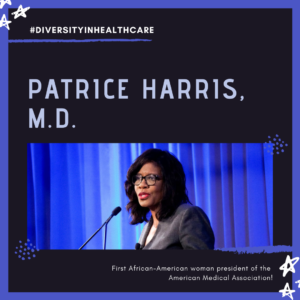
Hailing from West Virginia, she knew at an early age that she wanted to be a physician. Despite this, a guidance counselor advised her to go to nursing school. She decided to major in psychology instead and went on to graduate from the West Virginia University School of Medicine. She completed her residency and fellowship at Emory University.
Dr. Harris has an extensive history of leadership, having served extensively with the American Psychiatric Association, the American Medical Association, advocated with various legislative bodies, and held the position of director of Health Services for Fulton County, Georgia.
We salute her impressive CV and constant advocacy for children.
Sources: https://www.patriceharrismd.com/aboutindex; https://www.medpagetoday.com/publichealthpolicy/generalprofessionalissues/84916
Photo source: https://www.patriceharrismd.com/aboutindex
Throughout the fall semester, we will be highlighting #DiversityInHealthcare on our social media. This week we are focusing on Dr. Rebecca Lee Crumpler, the first African-American woman physician in the U.S.
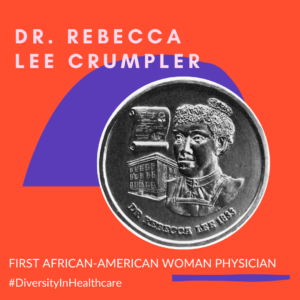
Born Rebecca Davis in Delaware on February 8, 1831, Rebecca was raised by an aunt in Pennsylvania, who spent much of her time caring for the ill and may have influenced her career choice.
By 1852 she had moved to Charlestown, Massachusetts, where she worked as a nurse for the next eight years. In 1860, she was admitted to the New England Female Medical College. When she graduated in 1864, Rebecca was the first African American woman in the United States to earn an M.D. degree, and the only African American woman to graduate from the New England Female Medical College (the school closed its doors in 1873.).
A few statistics help put her remarkable achievement in perspective. In 1860, there were only 300 women out of 54,543 physicians in the United States and none of them were African-American. As late as 1920, there were only 65 African-American women doctors in the United States.
Dr. Crumpler practiced in Boston for a short while before moving to Richmond, Virginia, after the Civil War ended in 1865. She joined other black physicians caring for freed slaves who would otherwise have had no access to medical care, working with the Freedmen’s Bureau, and missionary and community groups, even though black physicians experienced intense racism working in the postwar South.
In 1883, Crumpler published A Book of Medical Discourses from the notes she kept over the course of her medical career. Dedicated to nurses and mothers, it focused on the medical care of women and children.
No photos or other images survive of Dr. Crumpler. The little we know about her comes from the introduction to her book, a remarkable mark of her achievements as a physician and medical writer in a time when very few African Americans were able to gain admittance to medical college, let alone publish. Her book is one of the very first medical publications by an African American.
Rebecca Davis Lee Crumpler died on March 9, 1895.
https://cfmedicine.nlm.nih.gov/physicians/biography_73.html
Post written by Stefanie Lapka.